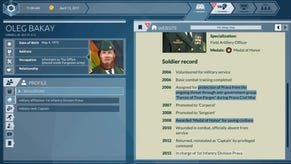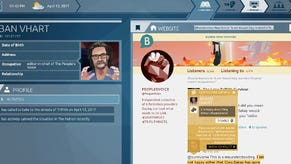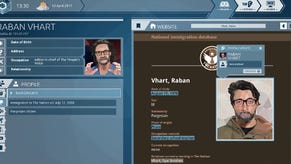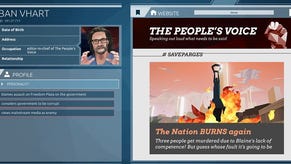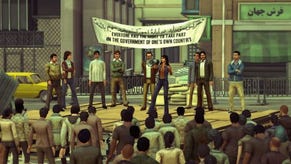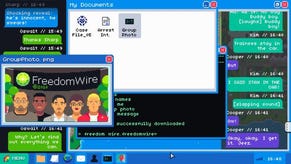Wot I Think: Orwell
Down And Out In Bonton And Parges
With the Snooper's Charter having very quietly been accepted into law in the UK at the end of last month with nary a bleat, thoughts of government surveillance have rarely been more topical. Orwell [official site] is a take on what such a system might look like in practice, with you the person given access to everyone's information. Think of it as a Papers Please for the digital age, with all the accompanying ethical dilemmas. Here's wot I think.
Orwell is the very on-the-nose name for a game about surveillance, government snooping, and the pitfalls of such systems. Set in a fictional country (The Nation), with a fictional government (The Party), surrounded by other fictional nations (Parges, Ustvakia, Gentria), (making it slightly peculiar that it then features actual Germany), terrorism is afoot, and you’re tasked with using snoopy tech to investigate potential suspects, and perhaps even influence the findings to your own end.
And I’ve loved playing this. It’s an enticing thriller, a deep, broad investigative journey into the private lives of a small collection of people, and most entertaining to pursue, despite a tissue-thin veneer of reality. I have so much to criticise about how this has been put together, because it’s ridiculously flawed, completely daft, and vulnerable to even the most casual of analysis. But the key thing is: I enjoyed it! Remember that.
When it comes to games where a new player is supposed to have an established role, developers seem to have the option of two problematic approaches. The more common is the completely daft situation where a long-established pro has to have the basics of their job and circumstances explained to them. The other, as is the case with Orwell, is for someone new to the role to suddenly be thrown into the deep end. This is usually the more narratively convincing approach, but it does require some hurdles of disbelief. Ones that Orwell certainly doesn’t clear.
You are a volunteer given access to the government’s new Orwell system, an ironically named surveillance tool that allows users to access personal information about citizens, collating from both their public social media accounts and snooped details from their private communications. The peculiarity - and pretty insurmountable conceit for the game - is that you have full access to all the details about a suspect, but your supervisor is (legally?) only allowed to look at the snippets you send him. It’s to prevent the government from being too powerful, see? By, um, giving all the information about people’s privacy to some person. And it’s through this conceit that the nature of how you can potentially manipulate the data is made possible
It then gets even more odd as you’re the first “test case” investigator for this new system, and yet despite that, you’re given work related to a terrorist attack that’s literally just taken place. Blimey - I’d save that up for someone who’d been on the job for at least a week.
But we must suspend our disbelief, no matter how precariously, if potential fun is on the line. And, it should be said, that as silly as the conceit may be, the effects of sharing information out of context are profound, and of course largely the game’s point. It’s very, very easy, when playing, to quite forget how information could be misconstrued. Early on you are spying on the text message chat of a suspect who jokes to her partner that she’s “stolen” his credit card, and plans to go on a spree. Share that snippet (and you can only share that which has been pre-selected by the developers), and your handler will take the matter quite seriously, and report the theft. Then of course, after realising how easily you forget that the context isn’t being seen by him, you can of course manipulate the delivery of information deliberately. Or indeed just choose to not share it at all. Quickly it becomes apparent how easily you can shape perception by what you choose to divulge. (Although I should add, the game does quite frequently forget its own fiction, with your handler having impossible insight into the details you’ve shared. Ah well.)
This all makes for an interesting and useful commentary on surveillance culture. Or at least it would if it weren’t so farcical as to have you playing as some applicant fresh off the street, rather than a long-in-the-tooth member of this government organisation. The idea that such an arrangement would be even considered is beyond credulity - even if the game does (unconvincingly) eventually try to address this. Never mind that it keeps piling on the ridiculous in the name of its own conceits, with such silliness as refusing to let you update information on the Orwell database that further research proves to be inaccurate. Why? Because the mechanics require it. It doesn’t even try to justify this one - it just says, “it can’t”.
But despite this, despite how eye-wateringly silly the whole concept is, you can suspend it all. I know, because I did. I slipped into its farcical groove, and then embraced it. I started collating, worrying, suspecting, excepting, making wrong guesses about where it was all going (one of which would have been an excellent alternative ending, if I do say so myself), and then piecing together the truth of the matter. It became apparent as I played that I could have a significant impact - so much so that I felt compelled to start the game again as soon as it finished to share information differently, to see what else might happen, and wanting to start a game again as soon as it’s over is a pretty good sign.
And rewarding it is to do so! I was surprised by how much I could change, making knowing decisions about what I did and didn’t share, skewing the results to surprising effects, even life or death results. I think, if anything, I spoiled my first playthrough by being right about everything (I stress, with luck as well as design), and not seeing the consequences of putting together a more inaccurate portrait. This is to a degree, of course. The game doesn’t offer infinite variety, and there are certain times when the only way to advance the story is to share some information that you might have wanted not to to maintain your own narrative.
Yet, I wish it asked more of me. For the most part your role is to drag across pertinent-looking pieces of information to the right profile, while not dragging across the clearly irrelevant ones. The actual research is severely limited. When you discover someone is a temp, instead of then being asked to go find a site relevant to that from a database, find a way to hack their account, etc, it just instantaneously links you to the logged in profile of that person. It takes a significant bite out of the thrill of the snoop. Find a suspect’s patient number, and you don’t get to explore a hospital’s database to find her in the logs - you just get magically logged into her medical records. And with this, the sense of achievement is mightily diminished. Getting to these records may get you the suspect’s accurate date of birth, but it’s very apparent that you really had no choice about the matter. It certainly wasn’t dependent upon your skill. Weirdly, early on, it does actually do this better, having your scour through some university teaching schedules, but sadly this is never repeated again.
The result is, as I've said, silly but affecting. Don't think about it for as long as you can, and there's lots of entertainment to be drawn out. While it laudably avoids taking an overt moral stance on the matter, this doesn't mean it employs subtlety in its delivery of the subject matter. There is no deep understanding here, you won't have your mind changed, and it certainly doesn't have any of the emotional impact of Papers Please. But within its own barmy universe, it works! It's a good chunk of fun, and easily survives at least a second play to see how much you can mess with people's lives.
Orwell is out now on Steam for £7/$10/€10. You can pick up a demo of the first chunk from Steam or IndieDB.







